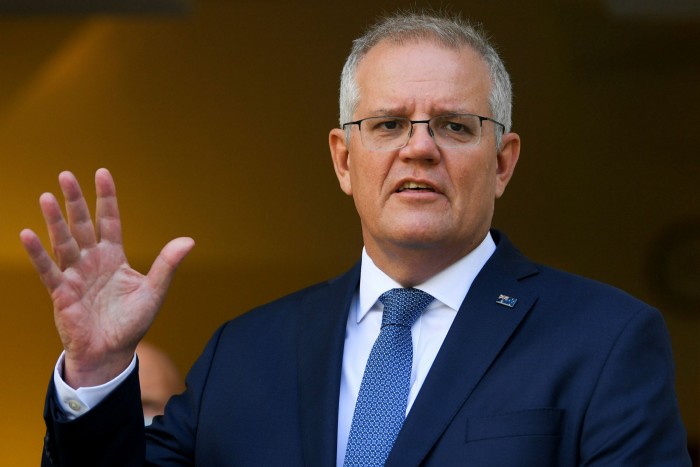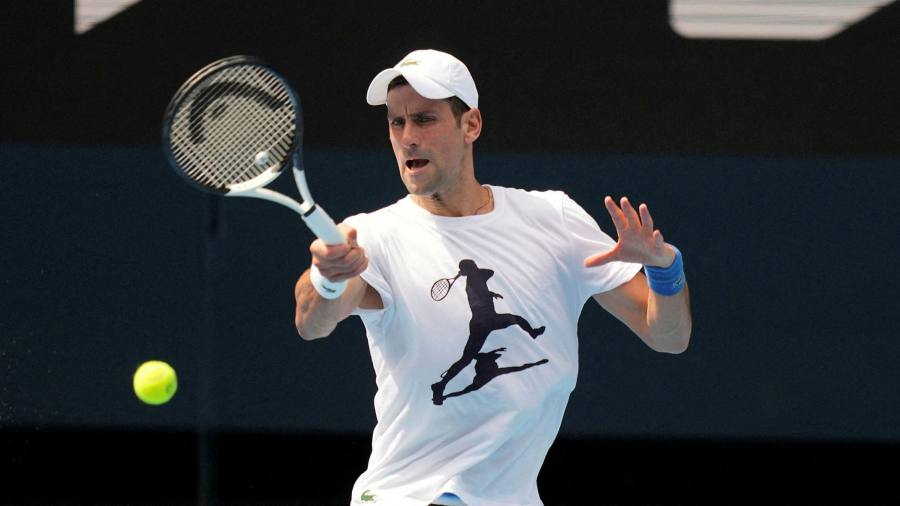There was little surprise when Australia’s prime minister Scott Morrison waded into the furore ignited by the vaccine exemption granted to tennis star Novak Djokovic to play in the first Grand Slam tournament of the year.
After all, Morrison’s government was being battered by a surge in Omicron cases, a shambolic testing system and empty supermarket shelves just months ahead of an election.
When Djokovic, the unvaccinated world number one men’s tennis player, announced that he was flying into Melbourne to defend his Australian Open title, Morrison, whose Liberal party is trailing Labor in the polls, went on the offensive.
The prime minister warned that Djokovic, who was still in the air, could be put “back on the first plane home”. Djokovic’s visa was duly cancelled and he was detained to await deportation.
But a federal court’s decision to quash the visa cancellation on Monday has embarrassed the Morrison government and focused attention on inconsistencies in Australia’s immigration laws in a country that prides itself on its tight border controls.
The bungled handling of the unvaccinated athlete has proven especially galling for voters who have had to endure some of the world’s toughest restrictions.
The court decision has left the Morrison government with two politically unpalatable options.
It could choose to let Djokovic’s visa stand, despite Morrison declaring that the player was not allowed to be in the country. Or it could once again cancel the visa and detain him. That, however, risks reigniting a diplomatic spat with the Serbian government and street protests in Melbourne, which has only just emerged from the longest Covid-19 lockdown in the world.
Morrison insisted last week that Djokovic was being treated the same way as anyone else who was trying to “run the border” into Australia.

The stance was welcomed by an Australian public that had reacted with fury to the news that a seemingly healthy Djokovic had been granted an exemption despite the country’s strict vaccination laws.
Mark Kenny, a professor at The Australian Studies Institute, said that the government was under immense pressure because of rising infection rates, Covid testing problems and supply chain challenges. But it had “sniffed the mood” of voters angered by Djokovic’s arrival.
“It looked pretty obvious Morrison was happy to look strong on borders and not talk about the manifold failures of the Covid testing. It looked for a moment like Morrison was on to a winner,” Kenny said.
For more than two decades, the Liberal party has made border control a central plank of its policies. The decision of whether to cancel Djokovic’s visa again will be made by Alex Hawke, the minister for immigration and one of the prime minister’s closest allies.
A government official said: “In line with due process, minister Hawke will thoroughly consider the matter. As the issue is ongoing, for legal reasons it is inappropriate to comment further.”
Maria Jockel at BDO Migration Services said that a minister using personal powers to cancel the visa again was not unprecedented. But it would need to be justified on public interest grounds and would probably be challenged, which would open up Australia’s border laws to greater scrutiny.
She added that the federal and state governments “collectively require the wisdom of Solomon” to find a solution to border issues such as that presented by the Djokovic saga.
Australia’s complex immigration laws have been pored over since Djokovic was detained at Tullamarine Airport in Melbourne last week. The player’s visa was issued by the federal government and his medical exemption was signed off by two independent panels of medical experts, one backed by the Victorian government, and granted by Tennis Australia’s chief medical officer.
But that did not guarantee him entry to the country and court documents revealed that Djokovic may have incorrectly filled out another document — a travel declaration — which is separate from the visa.
Kenny said that the decision to issue a visa to unvaccinated people who might not meet the requirements for entry forced the border force to “second guess” applications. “Ambiguity entered into the process,” he said.
The federal and state governments and Tennis Australia have tried to pass the blame over the controversy, with the exemption justification — that Djokovic had contracted Covid-19 in the past six months — fiercely debated.
Daniel Andrews, the Labor premier of Victoria, stressed on Tuesday that his government was not responsible for the border farce. “We have not sought to convince the Commonwealth government to allow anyone in. In fact, quite the opposite,” he said.
Anthony Albanese, the Labor party leader who will contest an election against the prime minister in the coming months, said: “Scott Morrison has failed on testing, tracing, vaccines and quarantine. That’s the grand slam of pandemic failures.”
Even some of Morrison’s own MPs called for the government to drop the issue. John Alexander, a Liberal MP and a former professional tennis player, said it would be a “mistake” to try to deport Djokovic after the court ruling. “I see it as something that should not become a political problem,” he told Australia’s public broadcaster ABC.
Yet Kenny argued that it already was a political dilemma for the government. “They either double down or they don’t,” said Kenny. “Either way there is a political cost to Morrison.”

